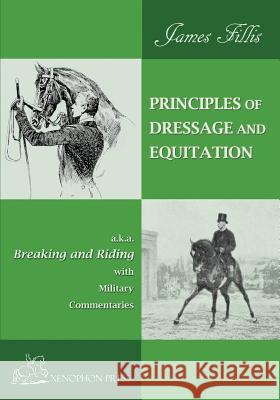Principles of Dressage and Equitation: also known as BREAKING AND RIDING' with military commentaries, The Definitive Edition » książka
Principles of Dressage and Equitation: also known as BREAKING AND RIDING' with military commentaries, The Definitive Edition
ISBN-13: 9780933316775 / Angielski / Miękka / 2017 / 300 str.
Principles of Dressage and Equitation: also known as BREAKING AND RIDING' with military commentaries, The Definitive Edition
ISBN-13: 9780933316775 / Angielski / Miękka / 2017 / 300 str.
(netto: 143,66 VAT: 5%)
Najniższa cena z 30 dni: 148,79
ok. 16-18 dni roboczych.
Darmowa dostawa!
James Fillis' masterwork, Breaking and Riding has been a touchstone of commonsense training for over a century. Xenophon Press has returned to the original French language manuscript entitled Principe de dressage et d'equitation and re-translated some of M.H.Hayes' translation of this work's references to 'breaking.' Fillis' used the term dressage two ways:1. basic training and taming of the horse;2. sophisticated advanced training.At the turn of the century (19-20th), dressage was not in use in the English language. Hence, the term was omitted from M.H.Hayes first English language edition and 'breaking' substituted. Xenophon Press' edition of this classic is fully footnoted and closely follows the original French edition. Complete military commentaries and robust footnotes make this the authoritative edition.We are proud to finally offer this great work in an appropriately accurate and complete edition.James Fillis (1834–1913) was English-born and became a revered French riding master. He was taught by Francois Caron, a direct student of Francois Baucher, and then studied with Victor Franconi, owner, and director of the Cirque Olympique de Franconi. Fillis was hired to train horses for the French Army during the Franco-Prussian War, and therefore his name is inscribed at Samur on the roll of Écuyeres Célèbres.While performing with the Ciniselli Circus in St. Petersburg, Russia - he drew the attention of Grand Duke Nicholas, and became Ecuyer en chef at the Russian Cavalry School.In this book, I do not presume to discuss scientific subjects. I am simply a horseman who has been among horses for sixty years, who knows them, loves them, and is capable of reasoning about them.The fundamental principle of the studies which I submit to the public is that it is necessary for a horse to be correctly balanced and light in forward movements and propulsion, in order that the rider may obtain the most powerful effects with the least exertion. My method of equitation consists in the distribution of weight by the height of the neck bent at the poll and not at the withers; propulsion by means of the hocks being brought under the body; and lightness by the loosening of the lower jaw. When we know this, we know everything, and we know nothing. We know everything because these principles are of universal application; we know nothing because they have to be applied practically. Practice cannot be taught in a book, but I will try to set forth principles. Probably, I would not have had the boldness to do this, had not one of my pupils entreated me to write this book; because he had been greatly struck with the aptness of the explanation which I gave him respecting the details of the training lessons. In judging this work, I trust that my readers will give it the attention it deserves, as the result of sixty years? serious study and hard practical work.I crave the indulgence of the public and the impartiality of my reviewers. JAMES FILLIS











